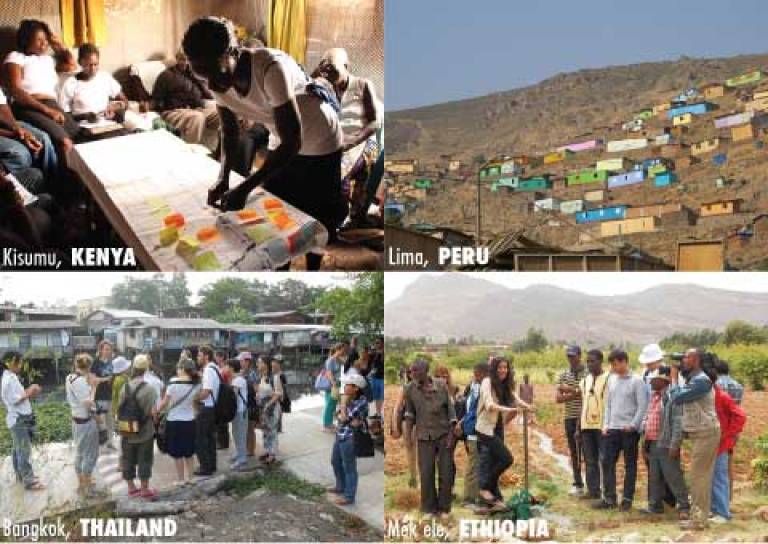Learning from the Field – DPU MSc Courses Go Overseas
3 June 2013

As happens every year in late April at the DPU, the six respective MSc courses recently embarked on field excursions to various points of the globe, seeking to immerse themselves in a wealth of experiential and contextual challenges facing informal and vulnerable settlements. Often pursuing new locales and topics of investigation, this year saw the initiation and establishing of new and hopefully lasting partnerships, while other maturing partnerships built successfully on past collaborations. The experiences across the different course fieldtrips once again solidified the DPU’s commitment to bridging the gap between classroom study and fieldwork while illustrating its on-going support of transforming communities throughout the world.
For the third year in a row, the MSc Development Administration and Planning (DAP) and MSc Urban Economic Development (UED) travelled to the city of Mek'ele in northern Ethiopia. Working towards “An Assessment of Ethiopia’s Growth and Transformation Plan and its Impact on Poverty Reduction and Social Justice in Tigray”, the student teams worked in conjunction with Mekele University professors to conduct research into this government-led initiative and its implications in the Tigray region. Topics of investigation included a wide range of development objectives including infrastructure, health, education, ICT, ADLI, and tourism.
Beginning a 3-4 year action research project in Lima, Peru in collaboration with Foro Ciudades para la Vida, the MSc Environment and Sustainable Development (ESD) action-learning platform “Transformative Planning for Environmental Justice in Metropolitan Lima” focused on the interface between water (in)justices, risk and urban development in five case studies throughout the city. Through an exploration of present outlooks and possible futures, each of these cases experiences different realities based on their geophysical and socio-political circumstances and position vis-à-vis particular institutional interventions and projects. From coastal districts and parts of the inner city undergoing market-led transformations to vulnerable communities in Lima’s lomas – closer to the sky than to the city – students worked closely with communities, NGOs and public bodies to understand barriers and potentials for environmentally just urbanisation.
Returning once more to a base in Bangkok, this year the MSc Building and Urban Design in Development (BUDD) and MSc Urban Development Planning (UDP) forged beyond the capital to explore other cities in the Southern Thailand region in collaboration with CODI’s Baan Mankong Housing Programme, the Community Architects Network (CAN), and various local Universities. Working across five different sites in the region under the notion of “Transformative Potential of Housing at Scale”, the students encountered a mixture of challenges facing collaborative people-centred partnerships for slum upgrading. Ranging from environmental concerns of flood mitigation, speculating on the impact of future large-scale infrastructure projects, or transitioning into the next phases of urban integration after housing construction is complete, the diverse trials facing the communities entering into or already operating within the programme provided a dynamic testing ground for understanding the obstacles in reaching city-wide change.
In Kisumu, Kenya, the MSc Social Development Practice students examined four water and sanitation interventions within three informal settlements under the idea of “Participatory Slum Upgrading and Well-Being”. Students firstly assessed the well-being impacts of their particular model of service delivery - exploring dimensions including dignity, health, empowerment, and security, as well as recognition, accessibility, and equity in relation to diverse identities within the settlements. Secondly, students explored the wider institutional environment and urban context in which the models were embedded, to comment upon the potential for scaling up and sustaining the positive participatory processes underlying each mode of service delivery.
Wherever they touched down, surely all the MSc student groups returned to London with lasting impressions of the many challenges facing communities the world over and reflections on the roles that development practitioners can play in productive collaboration.
 Close
Close

